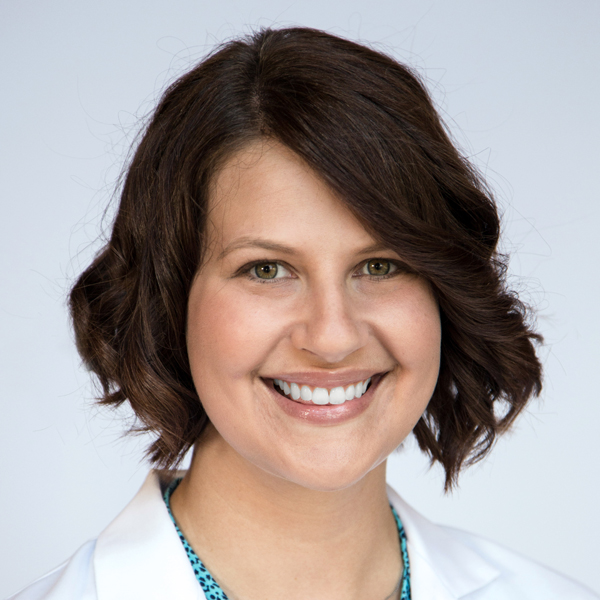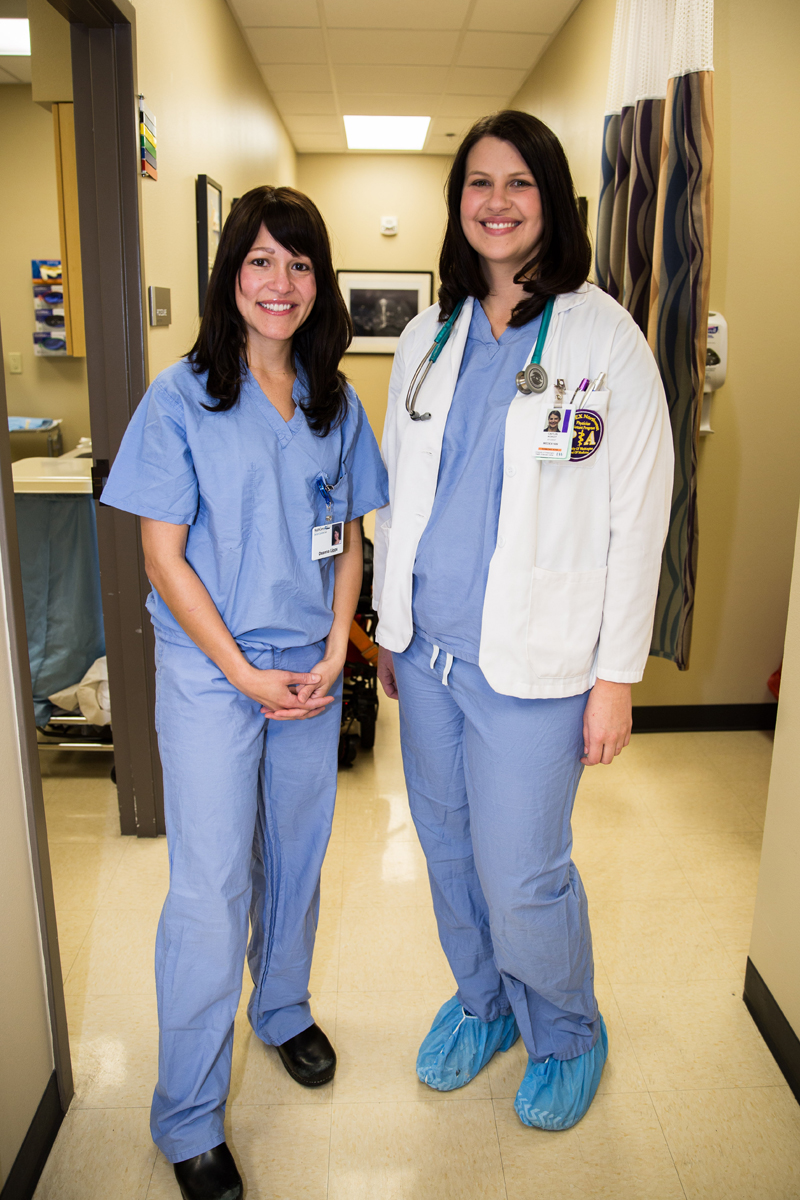Caitlin Kokot is in the midst of “gallbladder season,” a time when more patients than usual are being referred to Rockwood Valley Surgical Specialist with gallstones or cholecystitis.
“The term is really kind of a joke,” Caitlin tells us. Apparently, during the year-end holidays, people eat a lot more fat, which tends to provoke symptoms. “Yesterday, we took out five gallbladders in a row. That’s quite a few.”
It involves a 45-minute to one-hour procedure at this Spokane Valley clinic.
“People can live without their gallbladder,” she clarifies. “Most people do just fine and can go back to a normal diet. We see some people come in from the emergency room and they’re in a lot of pain. A few hours later they feel so much better. Other than a little bit of surgery pain, they recover very fast.”
It’s clear that Caitlin Kokot is in her element. A member of MEDEX Spokane Class 21, she’s in her general surgery rotation at Rockwood Valley Surgical Specialists under the guidance of Deanna Lipps, PA-C, herself a graduate of MEDEX Spokane Class 14 in 2012.
“It’s been great working with Deanna,” says Caitlin. “She’s very knowledgeable and the surgeons speak highly of her, which tells you a lot. They say she’s the best at suturing, the best at procedures. She really takes the time to make sure that I can practice the same skills just as well, rather than just having me watch all the time. She does a great job of making sure that, as a student, I get the hands-on experience that I need.”
Caitlin’s pathway to the MEDEX Northwest physician assistant program had a few challenges. For one thing, she’s a re-applicant, meaning that she was turned down on her first attempt.
“I’m actually very happy that I didn’t get in that first time,” she tells us. “I really love the people in my class. We really don’t have a lot of struggles, and they’re very intelligent. They help make me smarter. I can bring some of my orthopedic background, but for anything else I look to them to help me out. It’s a good thing.”
It’s her 8-year background as a certified athletic trainer that allows Caitlin to be so comfortable and knowledgeable about orthopedics.
As an athlete at the age of 12, she was injured in a soccer camp. The first person to see her was an athletic trainer.
“I didn’t even know that was a career,” she says.
Originally, the plan was to go into physical therapy and work with athletes. But in college, she was accepted into the athletic training program.
“I fell in love with the interaction with patients, and with being on the field with them.”
The day-to-day work of an athletic trainer placed Caitlin in a variety of situations. She did everything from outreach at a high school in Issaquah, WA to helping to run an ergonomics program at Seattle Children’s Hospital.
“I helped start and run this program to assist nurses and doctors with any pain on their job,” she explains. “Basically, it was for anybody who worked at the hospital and was having any complaints.”
In that role, Caitlin would assess the physical complaints of the healthcare workers by following them on their job and ordering any equipment that would help them to work pain-free.
“It’s not part of athletic training, but biomechanics is something that athletic trainers are very good at, so it just was natural to go that route,” she says.
As an athletic trainer, Caitlin also worked in an adolescent wellness clinic at Seattle Children’s Hospital.
 “I did motivational interviewing with children that were in the 95th percentile of weight to help them lose that weight and be healthy. Many of them couldn’t do typical exercise. So, we would do group programs to help them find ways to get healthier along with a nutritionist. Eventually, they could get back down to a healthier weight in order to prevent diabetes at a younger age.”
“I did motivational interviewing with children that were in the 95th percentile of weight to help them lose that weight and be healthy. Many of them couldn’t do typical exercise. So, we would do group programs to help them find ways to get healthier along with a nutritionist. Eventually, they could get back down to a healthier weight in order to prevent diabetes at a younger age.”
At Seattle Children’s Hospital she also worked at the Concussion Clinic as a physician extender, a name conferred on athletic trainers when working in a clinic environment. That’s when Caitlin met an influential physician assistant, Jeanette Kotch, PA-C. And like Caitlin, Jeanette was a former athletic trainer who went on to become a physician assistant through MEDEX Northwest.
“I worked with her a lot at that clinic,” Caitlin says. “She was kind of my mentor that helped get me to MEDEX as well. It was my exposure to her and the other PAs I worked with at Children’s that led me to this career path and helped me to discover that this is what I wanted to do.”
Caitlin is what’s considered a re-applicant to the MEDEX program. She was living and working in Seattle when she was called for an initial interview in January 2016. Her initial application for admission to Spokane Class 20 was not accepted.
“MEDEX told me to keep trying and go to the re-applicant section on the website where I could see ways to make my application a bit better.”
For further support, Caitlin reached out to PAs that had graduated from MEDEX. Together, they went over her admissions interview and discussed areas where she might have been weak or what she could do to improve.
For both her first and second application, MEDEX was the only PA school to which she applied.
“I’m sure I could’ve gotten into a different school my first time,” she says. “But this is the place I felt would be right. MEDEX was the place my mentors had gone.”
The MEDEX Mission speaks to the idea of lifelong learning, and that was one of the things that really stood out for Caitlin.
“I looked to the MEDEX Mission,” she says of her focus on this Northwest program. “It really spoke to me personally. We’re really never done learning. That’s something I truly believe in. I mean, I’ve been to school many times, so I definitely believe we constantly have to learn and get new information because medicine is ever changing. This spoke to me. So, I chose to come to MEDEX.”
Another reason was that the program is based in the Pacific Northwest. By the time of her second interview to MEDEX during the 2017 admissions cycle, Caitlin had moved from Seattle to her home in Eastern Washington.
“Spokane is where I want to be,” she says. “I moved back two weeks before the second interview. My high school lost its athletic trainer mid-season. So, I moved back to help out for the remainder of the year. I wanted to learn where I wanted to work.”
Always an athlete, the recreation opportunities surrounding Spokane are very appealing to Caitlin. Mount Spokane is a 15 to 20-minute drive from where she lives.
“I hike quite a bit, I do. It’s pretty much anytime I have a free weekend or don’t need to study too hard when I run out there. I am very outdoorsy, so I have missed the hiking over here.”
It’s a mere two months from graduation with her cohort of Spokane Class 21. There’s a celebratory trip to Europe planned, but Caitlin is thinking ahead to her career path as a certified physician assistant.
“Given my background as an athletic trainer, it’s always been a natural path for me to go into an orthopedic field. But after a general surgery rotation, I’m thinking more and more that I want to work in surgery. I feel at home in the OR. And PAs have a really important role there that I didn’t really understand before school. And now I see that we’re really vital to the surgeon.”
Caitlin waxes enthusiastic about her surgical experiences at Rockwood Valley Surgical Specialist.
“In surgery as a student, I can assist by holding the camera and giving the physician the ability to see so that he can do what he needs to do,” she explains. “And then I do a lot of the suturing closures, which is really helpful. I actually cut out some of my first lipomas last week. We had a patient in with several lipomas. I was able to help dissect them and suture them up. There’s a lot of suturing practice in this rotation.”

There’s a huge difference between suturing humans and suturing pig’s feet, a classroom exercise in the MEDEX didactic year. “The convenient part about surgeries is that the patients are most often asleep, so I can take as long as necessary,” she says.
Besides excising lipomas, Caitlin has been involved in a range of surgical procedures including hemorrhoidectomies, appendectomies, hernia repairs, wound care and debriding of wounds.
“Yeah, I’ve had a lot of hands-on procedural practice here, which has been really great,” she says. “I feel very comfortable when I’m around patients. I enjoy working with other people.”
Working as an athletic trainer, Caitlin often felt like she was sending patients away because she wasn’t able to fix the problem.
“I’d see them later once the problem was fixed. As a physician assistant, I’ll be able to solve the problem and help a more diverse population rather than just athletes. And with surgery, I’m actively hands-on solving a lot of the problems that people have.”

